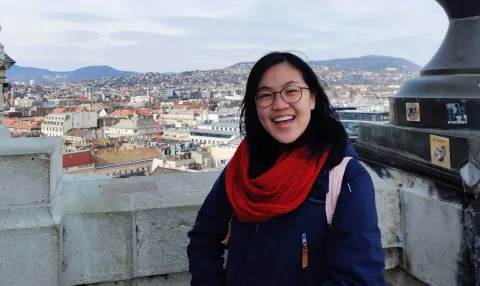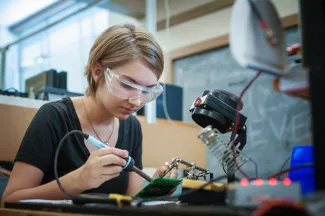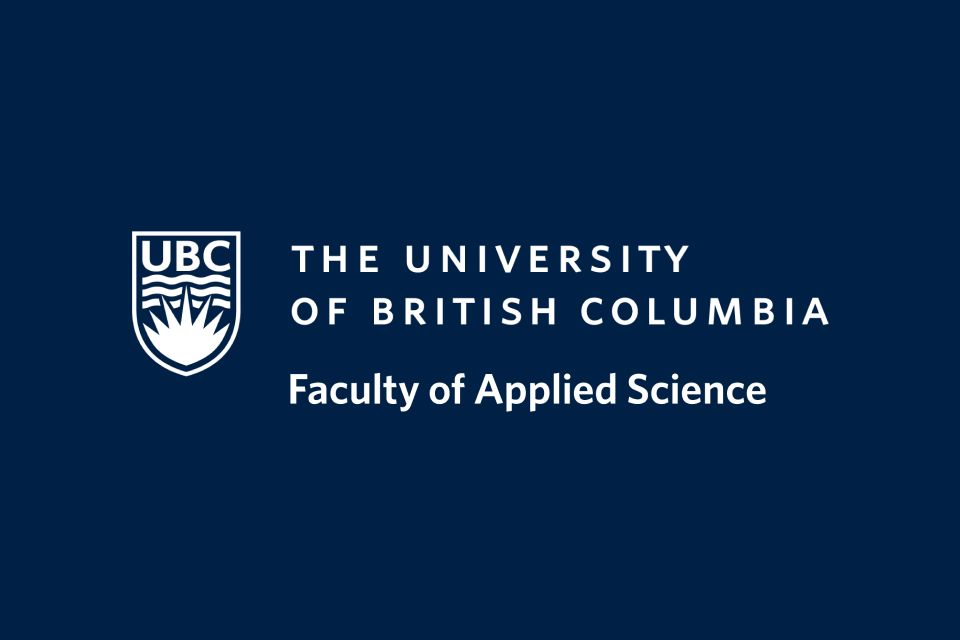"Engineering isn’t a solo endeavour, and even if that were possible, it wouldn’t be as fun."

Serena Chao
- Degree:
- Bachelor of Applied Science
- Grad year: 2020
- Program:
- Campus: Vancouver
My degree began as a melting pot of my original interests in writing, teaching and event planning, all of which I was able to leverage and build upon as I worked towards a career in project management and, most recently, strategy consulting in Berlin. Studying electrical engineering was my gateway into grasping the fundamentals of emerging technologies, a common thread in my experiences from working on the Amazon Alexa app for BMO Financial Group to working on Gadgeteer, a physics-based VR/AR game. Alongside my academic terms, I directed the UBC Engineering Competition twice, coordinated a VR project with the School of Music through the UBC Emerging Media Lab and supported hackathons with nwPlus. One of the highlights from my four years of working at Geering Up UBC in Engineering Outreach was starting a regular event series, Let's Talk Tech, to introduce elementary and secondary school students to emerging technologies and their vast industry applications. When the weather was right, I spent my weekends hiking, snowboarding or exploring what the West Coast has to offer.
Why did you choose to go into your field of study at UBC?
I always knew I wanted to pursue engineering and I’m quite sure it was because I attended girls-only engineering summer camps in my younger years. In high school, I was undecided between mechanical and chemical engineering. This drew me to UBC because it offered me the chance to explore what each discipline had to offer before ultimately deciding. Originally from Toronto, I also chose UBC for its proximity to the mountains, nature and a new city I hadn’t been to before. In second year, I was placed into electrical engineering. This wasn’t my first choice, but I remember people telling me to trust the process and that I should give it a chance for at least a year. I’m thankful because as I continued through the program, I kept discovering more aspects that piqued my interest like 3D printing, breadboarding and silicon photonics, the latter of which I wrote my undergraduate thesis on. What helped me embrace electrical engineering was the realization that the program is a solid foundation to a broad field and with that, there are tons of opportunities to find something that speaks to you and transfer this knowledge to a range of future pursuits.
What has made your time at UBC memorable?
The friends I have met through each step of the way made me feel connected to the UBC community and turned Vancouver into my second home. My most memorable campus involvements definitely correlate to the strongest bonds I’ve carried to the end of my degree and hopefully beyond. In fourth year, my capstone project was such a highlight. My team and I delivered an Excel program for BC Hydro that engineers could incorporate into their day-to-day workflow to optimize the placement of shield wires for transmission towers. It was fulfilling to work with a cohesive team and receive second place in the capstone video competition at Design and Innovation Day.
What has been your most valuable non-academic experience studying at UBC?
From residence musicals to AMS clubs, I did my best to explore as many groups as I could on campus. That was my way of getting to know UBC as best as I could. In second year, I was looking for an on-campus job and found one in Geering Up UBC’s Engineering Outreach. This was the place where I did impactful work, found a second family of energetic people from all across campus who were passionate about STEM outreach and grew alongside the organization for four years. When we were encouraged to provide more digital literacy programming, the team and I took the opportunity to create a monthly tech event series which reached over 400 youth in its inaugural year! Being able to take the concepts I learned in my labs and repurpose them into youth-friendly workshops was my way of continuing the cycle of sharing what I know about engineering to hopefully inspire someone else to pursue it as well. And of course, UBC Recreation events were some of my favourite memories. That includes capsizing into the Pacific Ocean during Day of the Longboat in first year and winning Gladiator with some of my closest friends.
Tell us about your experience in your program. What have you learned that is most valuable?
Electrical engineering is not to be underestimated but can be absolutely manageable with the right resources and support. Chatting with my peers was the best way to figure out how to balance the workload across our core courses and to ultimately succeed as a collective. As any student will likely tell you, engineering as a degree teaches you a lot about project management. From allocating the right amount of time to an assignment to managing a team, I found that these skills are best learned by doing and are not only essential to our careers but also to our personal lives. One thing I didn’t expect in my degree was the ability to find opportunities to write. In my fourth year, my technical electives often had reports and essays as part of the grading scheme which I discovered was one of the most conducive methods to my learning. Research and technical writing became one of my strengths and helped me learn about the type of work that I would like to do more of in the future.
How are you applying the skills you learned through your studies at UBC?
I feel like I’m learning to be more resourceful with each new opportunity. At the UBC Emerging Media Lab (EML), I learned about what goes into creating a VR experience. In any project or team, there’s an equal takeaway that contributes to our mental library. I started at the EML as a Project Coordinator despite my minimal software development experience because I had a willingness to learn and seek out the necessary answers. When I don’t know what questions to ask, I’ve learned to start with clarifying questions to establish a baseline of knowledge that can only increase from there. Throughout my degree, I was proactive in finding ways to contribute to my personal development but also left time for exploring new interests. I’m excited to continue carrying that mindset and seeing where that takes me.
What advice would you give a student entering your degree program?
Be authentic. There will be moments where you’ll be eager to say yes to things because they’re shiny and new but also where you’ll be scared to take the next step for fear of failure and that’s okay! I would try to embrace any opportunity that feels like it could contribute to your long-term goals. Everyone’s university experience is unique academically, socially and personally but you can make sure that you are actively driving it to meet your own expectations for the next few years. Also, understanding why you are taking any course, even core courses, is important to see how it fits into your degree and what you should aim to take away from it. If I could go back, I would sit next to someone new in every class, like I did in first year. For one, it would be easier to clarify notes but also making friends in classes is a key way to build community. Engineering isn’t a solo endeavour, and even if that were possible, it wouldn’t be as fun.
How do you feel your degree has benefitted you compared to a different field of study?
In hindsight, the most unique thing I gathered from my degree was the ability to grasp more abstract concepts and synthesize them into something more understandable. I really enjoy using analogies to relate scientific concepts into something that I can visualize in the real world. I won’t remember every formula or concept in detail, but my degree has been like a word cloud, a network of key words that I can use to remember how concepts fit into the world.
Where do you find your inspiration?
My constant sources of inspiration were my peers at UBC. Whenever I saw someone do something awesome on campus, I would often think about how I could find a similar opportunity. This translated into applying for countless opportunities so I could continue to surround myself with different people that always had something new to share. Since I knew that I am most energetic when surrounded by passionate people, immersing myself in different UBC groups each year became a rewarding cycle of finding new opportunities, friends and inspiration.
What are your immediate and/or long-term plans for the future?
After finishing my courses in December, I was thrilled to start working in the strategy consulting industry in Berlin, Germany. Although I’m back in Canada now due to Covid-19, I had such an adventure moving to Europe, adapting to a different work culture and industry and traveling on the weekends. In my current role, I am using both qualitative and quantitative methods to pinpoint future opportunities for a variety of industries. Engineering is definitely a unique path into consulting. However, like any career, you can always find skills that transfer over and can help you approach problems in a unique way. In the next ten years, I plan to write a book, obtain my pilot’s license and then go from there.
What are your future plans to make a difference in our world?
The plan is to contribute to the discourse around our evolving relationships with technology. Whether that’s through writing, community engagement, my career or all of the above, I’m curious about how expansive research and development from today will intertwine and how it can be shaped to form tomorrow’s ideals. At its simplest, I hope to bring a positive lens into the way we view the world as an interdependent system of cohesion rather than chaos.



